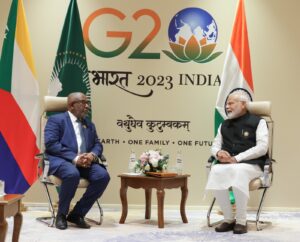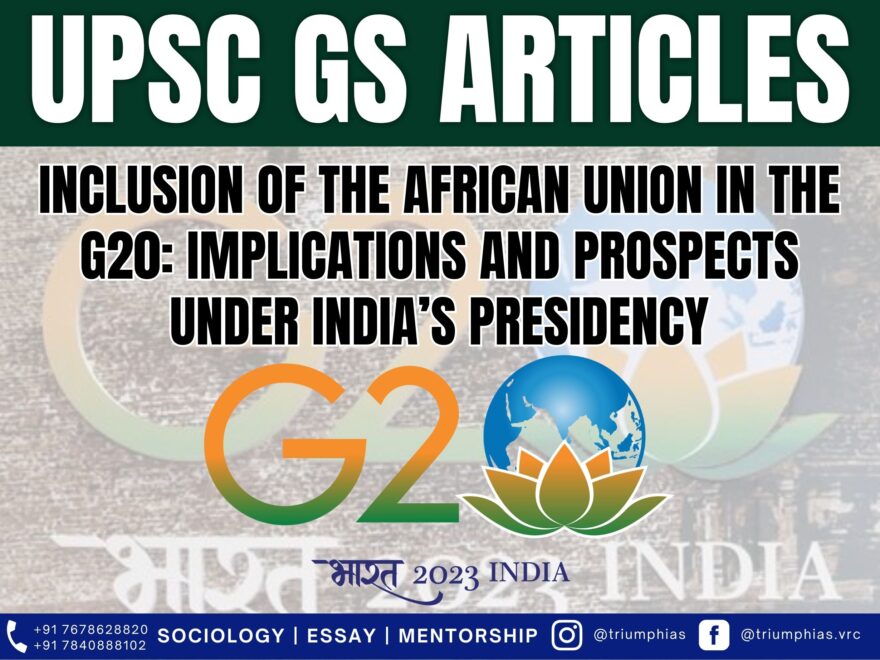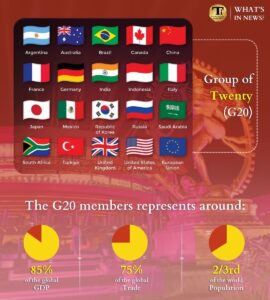African Union in the G20
(Relevant for General Studies Paper Prelims/Mains)

G-20: A New Forum for Developing Countries
The 18th G20 Summit, which took place in New Delhi in September 2023, marked a momentous development in the group’s history. The African Union (AU) was granted permanent membership, expanding the G20’s membership significantly. The AU, representing 55 member states across the continent, now holds the same standing as the European Union, the only other regional bloc with full G20 membership.
Advantages and Opportunities for Africa After Inclusion in G20
- The AU’s inclusion in the G20 marks a significant stride toward a more inclusive and representative framework for global governance. The AU serves as the representative body for a continent boasting a population of 1.4 billion people and a combined GDP of USD 3 trillion. Furthermore, Africa stands out as one of the world’s swiftest expanding regions, with a projected growth rate of 4.1% in 2023.
- Africa’s input and viewpoint are indispensable when it comes to addressing pressing global issues. These encompass the eradication of poverty, grappling with climate change, ensuring health security, navigating the digital transformation, streamlining trade facilitation, managing debt sustainability, and sustaining peace and security.
- The AU’s integration into the G20 framework not only extends benefits and opportunities to Africa but also furnishes advantages to G20 member nations. For Africa, it serves as a platform to propel its shared interests and aspirations onto the international stage. These objectives encompass the realization of Agenda 2063 and Agenda 2030, the effective operation of the African Continental Free Trade Area (ACFTA), the mobilization of climate finance and the transfer of technology, and the overhaul of international financial institutions.
- For G20 members, this development unlocks fresh channels for collaboration and partnership with Africa across a spectrum of sectors, including infrastructure development, the advancement of renewable energy, nurturing the digital economy, strengthening healthcare, fostering education, revitalizing agriculture, promoting tourism, and enriching cultural exchanges. It concurrently fosters a deeper level of mutual comprehension and trust among G20 nations and African counterparts.
Challenges Africa and the World Will Face in its Engagement with G 20
The inclusion of the AU in the G20 also presents several challenges, necessitating specific actions to ensure its effectiveness and sustainability. Some of these challenges include:
- Harmonizing AU Positions: The AU must effectively coordinate its stances and priorities with its member states and regional economic communities. This coordination is crucial to maintain coherence and consistency in its interactions with the G20.
- Strengthening Institutional Capacity: To actively engage in G20 processes and participate in diverse tracks and work streams, the AU must enhance its institutional capabilities and human resources.
- Balancing Commitments: The AU will need to strike a balance between its commitments and obligations within the G20 and its roles in other regional and global platforms, such as the African Union Commission (AUC), African Union Development Agency (AUDA-NEPAD), United Nations (UN), European Union (EU), Commonwealth, Francophonie, and more.
- Managing Divergent Interests: Given that different G20 members may harbor distinct agendas and perspectives on various issues, the AU must adeptly manage its expectations and interests in alignment with those of other G20 nations.
- Ensuring Tangible Outcomes: The AU’s involvement in the G20 must yield concrete results and advantages for Africa’s development. It should be geared toward producing measurable outcomes and benefits for the continent.
Development Cooperation Under India’s G20 Presidency
|
The AU should establish a dedicated mechanism or unit within its structures to coordinate its engagement with the G20. This mechanism or unit should liaise closely with the AUC, AUDA-NEPAD, regional economic communities, member states, civil society, the private sector, and other stakeholders to formulate and communicate Africa’s positions and priorities on the G20 agenda.
Frequently Asked Questions:
Question 1: What is the concept of ‘Vasudhaiv Kutumbkam,’ and how has it influenced India’s presidency in the G20?
Answer:
‘Vasudhaiv Kutumbkam’ translates to ‘One Earth, One Family, One Future,’ and underpins India’s G20 presidency focused on inclusive and sustainable development, climate finance, and global cooperation.
Question 2: How does the inclusion of the African Union in the G20 change the dynamics of global governance?
Answer:
The inclusion diversifies the G20 by bringing in the perspective of 55 African countries, making the platform more inclusive and representative in addressing global challenges like poverty, climate change, and sustainable development.
Question 3: What challenges does the African Union face in harmonizing its positions within the G20?
Answer:
The AU faces challenges in coordinating stances with its 55 member states, balancing multiple regional and global commitments, and managing divergent interests among G20 nations.
Question 4: What opportunities does the African Union’s membership in the G20 bring for global development?
Answer:
The AU’s membership opens new avenues for partnership in sectors like infrastructure, renewable energy, and digital economy, promoting mutual understanding and offering a platform for Africa to articulate its developmental goals.
Question 5: How has India contributed to development cooperation with Africa?
Answer:
India has been a key partner in Africa’s development, extending $10.5 billion in credit lines for various projects and initiating flagship programs in agriculture, healthcare, and digital technology.
To master these intricacies and fare well in the Sociology Optional Syllabus, aspiring sociologists might benefit from guidance by the Best Sociology Optional Teacher and participation in the Best Sociology Optional Coaching. These avenues provide comprehensive assistance, ensuring a solid understanding of sociology’s diverse methodologies and techniques.
African union in the G20, G20, G20 upsc, G20 upsc 2023, G20 upsc india, G20 upsc question, G20 Upsc notes, G-20African Union, India Presidency, Global Governance, Development, Challenges, Opportunities, Sustainability, Climate Finance, Economic Growth

Why Vikash Ranjan’s Classes for Sociology?
Proper guidance and assistance are required to learn the skill of interlinking current happenings with the conventional topics. VIKASH RANJAN SIR at TRIUMPH IAS guides students according to the Recent Trends of UPSC, making him the Best Sociology Teacher for Sociology Optional UPSC.
At Triumph IAS, the Best Sociology Optional Coaching platform, we not only provide the best study material and applied classes for Sociology for IAS but also conduct regular assignments and class tests to assess candidates’ writing skills and understanding of the subject.
Choose The Best Sociology Optional Teacher for IAS Preparation?
At the beginning of the journey for Civil Services Examination preparation, many students face a pivotal decision – selecting their optional subject. Questions such as “which optional subject is the best?” and “which optional subject is the most scoring?” frequently come to mind. Choosing the right optional subject, like choosing the best sociology optional teacher, is a subjective yet vital step that requires a thoughtful decision based on facts. A misstep in this crucial decision can indeed prove disastrous.
Ever since the exam pattern was revamped in 2013, the UPSC has eliminated the need for a second optional subject. Now, candidates have to choose only one optional subject for the UPSC Mains, which has two papers of 250 marks each. One of the compelling choices for many has been the sociology optional. However, it’s strongly advised to decide on your optional subject for mains well ahead of time to get sufficient time to complete the syllabus. After all, most students score similarly in General Studies Papers; it’s the score in the optional subject & essay that contributes significantly to the final selection.
“A sound strategy does not rely solely on the popular
Opinion of toppers or famous YouTubers cum teachers.”
It requires understanding one’s ability, interest, and the relevance of the subject, not just for the exam but also for life in general. Hence, when selecting the best sociology teacher, one must consider the usefulness of sociology optional coaching in General Studies, Essay, and Personality Test.
The choice of the optional subject should be based on objective criteria, such as the nature, scope, and size of the syllabus, uniformity and stability in the question pattern, relevance of the syllabic content in daily life in society, and the availability of study material and guidance. For example, choosing the best sociology optional coaching can ensure access to top-quality study materials and experienced teachers. Always remember, the approach of the UPSC optional subject differs from your academic studies of subjects. Therefore, before settling for sociology optional, you need to analyze the syllabus, previous years’ pattern, subject requirements (be it ideal, visionary, numerical, conceptual theoretical), and your comfort level with the subject.
This decision marks a critical point in your UPSC – CSE journey, potentially determining your success in a career in IAS/Civil Services. Therefore, it’s crucial to choose wisely, whether it’s the optional subject or the best sociology optional teacher. Always base your decision on accurate facts, and never let your emotional biases guide your choices. After all, the search for the best sociology optional coaching is about finding the perfect fit for your unique academic needs and aspirations.
To master these intricacies and fare well in the Sociology Optional Syllabus, aspiring sociologists might benefit from guidance by the Best Sociology Optional Teacher and participation in the Best Sociology Optional Coaching. These avenues provide comprehensive assistance, ensuring a solid understanding of sociology’s diverse methodologies and techniques. Sociology, Social theory, Best Sociology Optional Teacher, Best Sociology Optional Coaching, Sociology Optional Syllabus.
Best Sociology Optional Teacher, Sociology Syllabus, Sociology Optional, Sociology Optional Coaching, Best Sociology Optional Coaching, Best Sociology Teacher, Sociology Course, Sociology Teacher, Sociology Foundation, Sociology Foundation Course, Sociology Optional UPSC, Sociology for IAS,
Follow us :
🔎 https://www.instagram.com/triumphias
🔎https://www.youtube.com/c/TriumphIAS
https://t.me/VikashRanjanSociology
Find More Blogs
|
Scope of the subject and comparison with other social sciences |
|||
|
|
|
|
Modernity and social changes in Europe |



2 comments